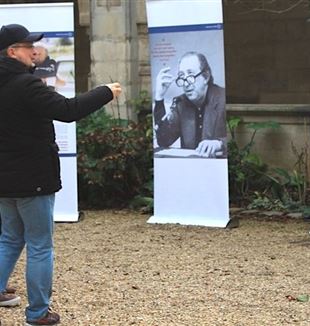
Paris: The sign that an answer exists
The French community also celebrated the centenary of Fr. Giussani's birth in the capital. Among meetings and testimonies, a chance to "verify deeply the truth of our experience".In Paris we celebrated the centenary of Fr. Giussani's birth. They were two wonderful days, including meetings, exhibitions, and above all life together. A totally unexpected richness, which surprised everyone, starting with those who were encountering us for the first time. Alberto recounts, "Today I asked one of my colleagues who came to the event what she thought. She told me, 'I think people like you, who are part of movements like yours, are happier than average people. Either you are on drugs, or I don't know.... I was looking at you in those days, and you could really see that you are happy.'" This gladness was so palpable in the gazes, in the way of spending time together, that we were the first to be amazed by it. What generated it? It is difficult to describe it in words; let us just try to recount some significant features.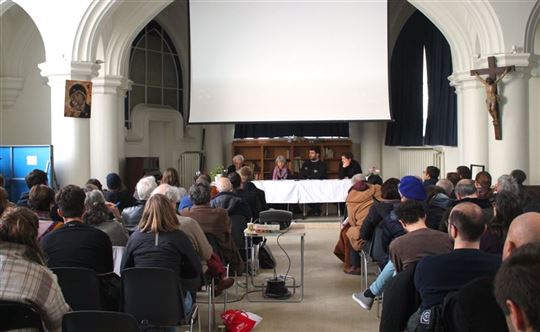
The protagonist of the centenary
The first "miracle" was the organization of this event itself: begun in April 2022 with a dozen friends, some from the very beginning, such as Dino Quartana, others we have met in the last year. At the heart of our coming together is our gratitude for this history that has taken us and continues to take us, without which we would not be ourselves. From this amazement came the idea of proposing a public gesture in which we could show everyone a life, the life that was born from this encounter. In the months that followed, our enthusiasm clashed several times with the problems involved in organizing such an event in a reality like Paris. But it was precisely the difficulties that highlighted the real star of this centenary. Marta recounts, "What amazed me – and what I think made what happened possible, certainly not our organization – is that everyone gave themself to others according to their abilities and sensitivity, wanting to recount about when they have felt loved. Because each person was loved in their own way and in their own way wanted to love. This I saw in my friends. And in me, with all my limitations." Giovanni echoes her, "I found myself giving myself everything with gratitude, because once again I realize that without this story you go nowhere. And it was precisely this great gratitude that I found myself with that put my heart at peace after such a long time."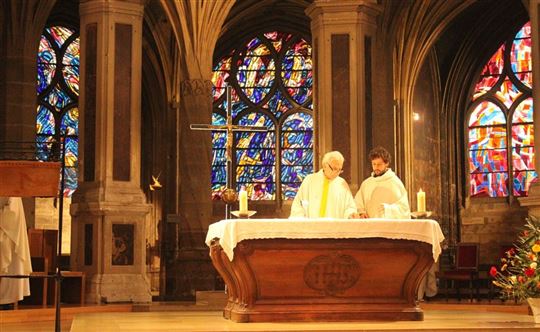
This is what happened through the dedication of the 30 or so volunteers who served this missionary gesture, as Paolo recounts, "The experience of simply adhering to what was proposed, not as an executor but as a protagonist – even in a humble task such as catering – was a source of gladness and awareness of what corresponds to me. During the months of preparation and last weekend, I experienced something very similar to the wonderful experience as a volunteer at the Rimini Meeting: the joy, the marveling at the small and big encounters and unexpected events, the clear awareness that I was participating in the construction of a great and beautiful event, one that promotes attention to others down to the smallest details (right down to our way of wrapping paper towels around sandwiches...). The moments of companionship among us were very simple, but rich with a Presence." Witnessing the spectacle of this Presence at work among us was too good to stop at the difficulties, and so, to our surprise, the initial idea came to fruition.
A love story
"We are here because of a love story," introduced Stefano on the Friday, sitting next to philosopher Fabrice Hadjadj for the opening meeting. The room was packed, beyond expectation: most are friends and colleagues encountering the reality of CL for the first time. Hadjadj introduced us to the depths of the word sign, so dear to Giussani and certain French authors. Sign that reveals and that conceals, the possibility of a free relationship of love. He echoed the words of Fr. Giussani, chosen as the theme of the weekend: "The true protagonist of history is the beggar: Christ who begs for man’s heart, and man’s heart that begs for Christ." It was precisely this love story that was the focus of the weekend, and the testimonies spoke of it. These included Dino Quartana, a pupil of Giussani’s in that famous first class at the Berchet high-school, in whom "the fire of this encounter still burns, and that is why I am here today"; Marie-Michèle Poncet, whose eyes shone with an unmistakable light when she recalled her first meeting with Giussani, fifty years ago; Jesús Iglesias Cobo, a young Spanish priest who recounted how in this love story nothing is censored. That is why, as poet Jean-Pierre Lemaire elaborates, Fr. Giussani also loved less orthodox authors: "He was interested in questions, more than answers. Because the questions are the sign that the answer exists." The two exhibitions, on Fr. Giussani's life and on Alberto Giacometti, also spoke of this.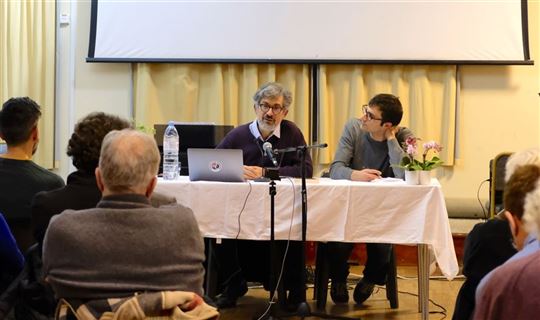
The second "miracle" of this weekend was the reoccurrence, the rekindling of this love story in many of us. For Giovanni it happened in front of the testimonies, "I was moved to listen to Dino and to think that the human story that began in those pews has come down to me, miserable as I am, and saves me from my nothingness. Now I find myself eager to get involved in everything." For Roberto it happened again in explaining the exhibition on Fr. Giussani: "Presenting it allowed me to tell the story of the movement, putting in my own experience, how it has changed and is changing my life. [...] The wonder was especially in me: in observing once again the beauty of the path."
But what unites you?
It was precisely this reoccurrence, contagious, that was the point of novelty encountered by the many first-time visitors invited. Like Philippe, who exclaimed in amazement, "But what unites you? What makes all these young people be here?" Over drinks, he filled us with questions. "There is a need for this experience in France! And there is a need for the French Church to open up to these realities," he concludes. He also decided to stay for the evening of songs, titled: There's a crack in everything. That's how the light gets in, a journey of rediscovering pop songs to enter into dialogue with the hearts of contemporary artists. He left thanking the organizers, his eyes beaming, "What energy!" An energy that amazes the singers themselves, as Paolo recounts, "None of us, until an hour before the evening began, could have imagined what would happen. Among those of us in the band, we experienced unity and attention, a calmness even in the face of imperfection. We were present! To those who thank and congratulate, I do not know what to say, we too are as amazed as they are.... Where does this gusto come from, which prevails over our littleness... we who fight even to decide how to dress on the night of the performance?" Carla also wanted to prepare for this evening, fascinated by the enthusiasm of some friends, but, not knowing how to sing, she did not dare to involve herself too much at first. "Don't worry, we will find something for you to do too," they told her. "Starting from this gaze and this heart's desire, which was shared, everything changed. In particular I changed," she says.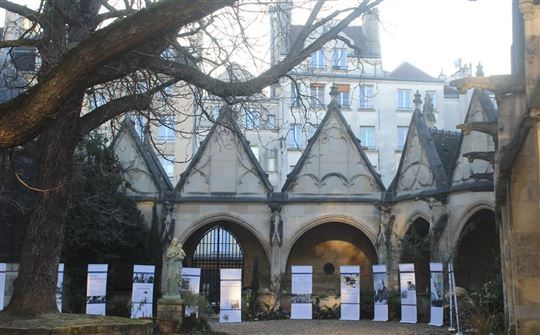
The third "miracle" was the unity among us, which surprised us. In his talk, Fr. Gabriel Richi Alberti, professor of theology at Saint Damasus University, described what we saw happening before our eyes: "The event of Jesus Christ remains in the today of history, offered to my freedom, through the communion of Christians: the Church. A communion that Christ himself generates: it is not our work. This is why we can say that communion is the form of the event in the present, that is, the historical form in which the encounter with Christ takes place. "The Master is here and is calling you" (Jn 11:28). These are Martha's words to her sister Mary after the death of Lazarus. These words describe that Christ himself, the Master, is the one who calls us into the present of our history and does so in and through communion, which is the form of his coming into the present."
153 big fish
The fourth "miracle" was the amazement at an overabundance, as Paolo recounts, "Two thousand years ago Jesus said, 'Cast the net on the right side of the boat,' today he tells us, 'Prepare an appetizer for 100 people'... it is the same thing. And we also brought 153 big fish ashore...." What does this overabundance consist of? Natalie, at the forefront of the organization, discovered this: "The thing that surprised me most was on Saturday night, when I arrived home and realized that I was very happy, whereas I could have been tired and exhausted after all we had done. A deep and serene joy that I did not understand. The next day, when I picked up a text by Fr. Giussani again, the answer was clear. There was the sentence, ‘I am very loved. I only need this and this alone is enough for me.’ I am loved and that is enough for me! And that is where my joy comes from, despite my weariness. What else do I need? To recognize that I am loved and that this is enough for me to live fully." It is thus the miracle of a self that is reborn, which rediscovers all its need, and returns to seek Him, playing itself out in the challenges that the days hold for us. As Fr. Gabriel writes upon his return to Madrid, "It was, once again, an opportunity to verify the grace of Christ's presence in our communion, the concrete fact that He is everywhere in our homes, and also an opportunity to grow in our awareness of our responsibility to the world. We have nothing more to do in the daily fabric of our existence than to witness to Christ." Because, as Susanna writes, "in these days it has been evident to me that communicating what we have encountered is the way to verify deeply the truth of our experience."
Stefano, Paris#100Initiatives